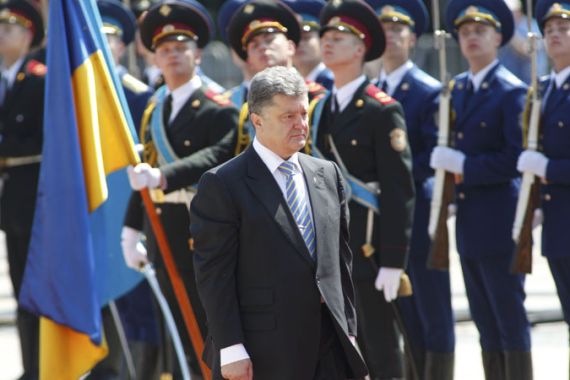Putin ‘supports’ cease-fire in Ukraine’s east
Moscow expresses support for Kiev’s cease-fire initiative with rebels, but says both sides must engage in negotiations.

Russian President Vladimir Putin has expressed support for Ukraine’s unilateral cease-fire in its conflict with pro-Russian separatist rebels and appealed to both sides to halt all fighting.
But he he warned on Saturday that Ukrainian President Petro Poroshenko’s plan for peace would not be viable without first engaging in talks with the rebels.
Putin’s conciliatory words came on the same day he ordered large-scale military excercises in Russia that could raise tensions with Kiev.
It remains unclear whether Russia can or will influence the pro-Russian fighters to de-escalate the conflict.
Putin has consulted with Poroshenko several times by phone on the Ukraine cease-fire initiative, but earlier Russian statements on the peace plan had criticised it sharply as an “ultimatum” seeking to pressure rebels to disarm.
Truce violated
Putin’s statement came shortly after pro-Russian separatists attacked several Ukrainian army posts on the border with Russia, government forces said, putting the Ukrainian unilateral cease-fire under pressure.
The attacks came just hours after the start of the temporary cease-fire, which was declared by Poroshenko at 10pm on Friday as part of his plan to end the rebellion in the east of the country.
A government forces spokesman said the separatists used mortars and sniper fire to attack army posts at Izvareno and Uspenka on the border, wounding nine Ukrainian officers.
Rebels with big calibre machine guns and grenade-launchers also attacked a Ukrainian position at Avdiyivka, near the main regional town of Donetsk, and a Ukrainian post at Kreminna, the army said.
Separatists controlling Slaviansk also attacked Ukrainian forces on Karachun hill overlooking the town with mortars and grenade-launchers, the spokesman, Vladyslav Seleznyov, said.
“In all these episodes, the attacks of the (rebel) fighters were deflected” without loss, Seleznyov said.
Ukrainian forces also repelled two attacks by around 50 heavily-armed fighters in the early morning on an air defence base at Avdiyivka, which houses surface-to-air missiles, the defence ministry said.
No Ukrainian personnel were hurt.
The rebels, who have seized strategic points in major towns including Donetsk and set up “people’s republics”, saying they want to join Russia, said Ukraine has broken its own ceasefire.
‘Cease-fire not working’
Alexander Borodai, prime minister of the self-declared Donetsk People’s Republic, told a news conference the cease-fire was not working and appealed to Russia to send in peacekeeping forces.
The continuing concentration of Russian armed forces and their heightened activity near the border with Ukraine causes special concern against a background of numerous facts that confirm weapons and military equipment are being supplied to the terrorists
“Since last evening, combat activities are continuing. Poroshenko’s artillery is bombing Slaviansk and the air force has made several raids. Words about a cease-fire as always were just that – words,” Borodai said.
“The anti-terrorist operation against the people of the Donbass is in full swing,” he said.
Pavel Gubarev, a prominent rebel leader, told Rossiya-24 TV channel that either Ukrainian troops were not obeying orders or Poroshenko “is lying”, adding: “There is no ceasefire at all.”
Poroshenko, installed on June 7 as president after seven months of turmoil in the ex-Soviet republic, ordered government forces to cease firing to allow his 15-point peace plan to take root.
The separatist movement in the Russian-speaking east erupted in April after street protests in the capital Kiev toppled the Moscow-backed Viktor Yanukovich. Russia subsequently annexed Ukraine’s Crimean peninsula.
Poroshenko has offered an amnesty to separatists who disarm voluntarily as well as corridors to allow fighters from Russia or pro-Russian Ukrainian separatists to leave safely for Russia.a diplomatic push to sell his plan but his biggest challenge will be to win over Russian President Vladimir Putin.
Relations with Moscow are at rock bottom and Kiev accuses Moscow of fomenting the unrest.
The Kremlin on Friday denounced the cease-fire as an ultimatum rather than a peace offering and Russian Foreign Minister Sergei Lavrov expressed concern about Ukrainian military action.
“It is disturbing and raises concerns that, simultaneously with this (cease-fire) announcement… the so-called anti-terrorist operation is increasing,” Interfax quoted him as saying during a visit to Saudi Arabia.
Ukraine, for its part, expressed concern on Saturday about an increase in Russian military movements near the border, saying Moscow could be supplying separatist fighters with weapons.
“The continuing concentration of Russian armed forces and their heightened activity near the border with Ukraine causes special concern against a background of numerous facts that confirm weapons and military equipment are being supplied to the terrorists,” Ukraine’s Foreign Ministry said in a statement.